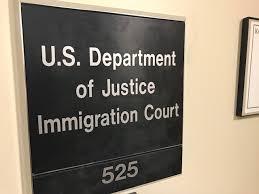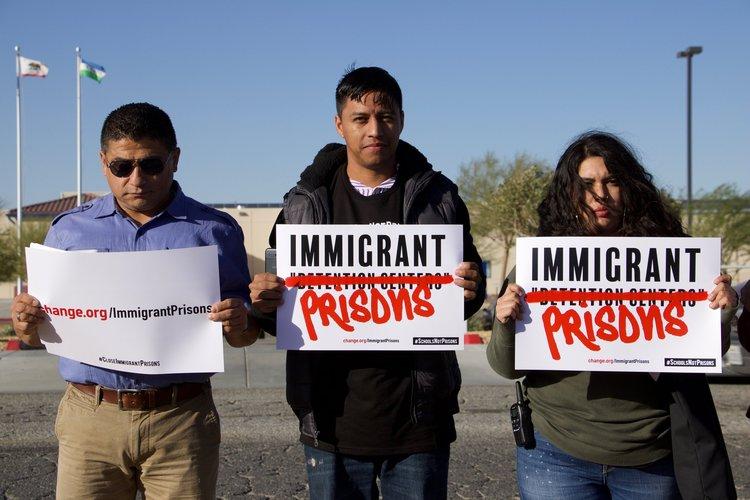- Home
- About Us
- Issues
- Countries
- Rapid Response Network
- Young Adults
- Get Involved
- Calendar
- Donate
- Blog
You are here
Anti-Militarism: News & Updates
Event
November 13, 2020
The US operates the largest immigration detention system in the world, with over 50,000 immigrants imprisoned in for-profit private detention facilities and county jails across the country prior to the pandemic (now approximately 20,000). These facilities, which are often money-making businesses, have been scrutinized for the egregious conditions to which they subject immigrants including poor to non-existent medical care, subpar hygiene and nourishment, and psychological and bodily abuse. This systemic neglect has led to the death of over 200 immigrants in detention since 2003. Despite the efforts of immigration advocates and medical experts to shut down immigration detention facilities during the COVID-19 pandemic, social distancing being an absolute impossibility, immigrants continue to be detained and transferred among facilities. Most recently, reports have emerged that some detainees have been subjected to unwanted hysterectomies and other forms of gendered abuse. This session provides an overview of the US immigration detention system and the social justice actions challenging these horrendous human rights abuses.
Event
November 6, 2020
United States immigration courts are not courts of law in the traditional sense, as the term is used in the federal court system. They are part of an administrative office, the Executive Office of Immigration Review (EOIR), housed in the Department of Justice (DOJ). Most often, immigration judges are former attorneys elected and hired by the Attorney General in order to perform the duties and rules prescribed regarding immigrants the government is trying to deport. Studies have shown that decisions made in similar asylum cases by different immigration judges can vary widely, making the immigration court system highly arbitrary and prone to politicization. This session takes a look at the structure of the immigration court system, its general procedures, and main actors. We will also discuss the situation of unaccompanied children forced to appear in immigration courts alone and with little access to legal representation.
Event
October 30, 2020
The United States asylum process is an incredibly convoluted system, designed explicitly to involve multiple decision-making actors, with lengthy times of processing and scarce chances of obtaining asylum protections. It is also an adversarial process: instead of being received by specialists trained in international refugee law and being given access to legal and social services, asylum seekers arriving at the US-Mexico border have been forced to endure confrontational and abusive treatment by immigration enforcement agents and immigration judges, the cruelty of an opaque bureaucracy sometimes used as a weapon against them, prolonged detention, and most often deportation. In the past few years, asylum seekers have been stripped of their human rights, placed in expedited removal, detention, and deportation proceedings with little recourse to legal representation or community support. Under the cover of the pandemic, most asylum seekers have been blocked altogether from requesting asylum and forced to wait in makeshift refugee camps on the US-Mexico border. This session will take a look at the history of the US asylum process, the human rights abuses perpetrated against asylum seekers under different administrations, and the latest immigration reform policies that aim to shut down asylum altogether.
Event
October 23, 2020
United States border enforcement has historically relied on discriminatory legislation that has criminalized migration and on deliberate practices of deterrence with the purpose of controlling and blocking the movement of poor immigrants of color. This has led to high levels of violence, human rights abuses, and the loss of many lives, making the US-Mexico border in particular one of the most dangerous places for migrants worldwide. This session focuses specifically on the US-Mexico border because it has been both a space for the exploitation of migrant labor and one of the most heavily militarized theaters of violence against immigrants and asylum seekers in the past decades. We will discuss the laws that criminalize entry without documents, the process of expedited removal, and zero tolerance policies, which have led to the arbitrary detention of asylum seekers and migrants, family separation, fast-track deportation, and other human rights abuses.
News Article
Second Military Style Raid in Two Months: Border Patrol detains 12 people receiving humanitarian aid
October 6, 2020
In a massive show of armed force, Border Patrol, along with the Border Patrol Tactical Unit (BORTAC), descended on the camp with an armored tank, ATVS, a helicopter, and many marked and unmarked vehicles. Agents armed with assault rifles chased and terrorized those that were receiving care, all while the helicopter hovered low above them kicking up dust and debris, making it nearly impossible to see. Border patrol smashed windows, broke doors, and destroyed essential camp infrastructure as well as supplies.This was after heavily surveilling the camp and patrolling its perimeter, creating an antagonistic and distressing environment for those receiving care, since late Saturday night on the 3rd.
News Article
October 6, 2020
“Every day that passes we know less about him. He’s weak, he’s had Covid symptoms; we worry about his health and safety in the prison.” Gabriela Sorto expresses great concern for her father Porfirio Sorto Cedillo, a 48-year-old builder and farm worker, who is one of eight protesters from Guapinol held in pre-trial detention since September 2019 for alleged crimes linked to their opposition to an iron oxide mine which threatens to contaminate their water supply. The community of Guapinol (named for its river) is in the fertile, mineral-rich Bajo Agua region, where for years subsistence farmers and indigenous Hondurans have been forcibly displaced, criminalized and killed in conflicts with powerful conglomerates over land and water. “My dad has been jailed for defending a river which gives our community life, for trying to stop the exploitation of natural resources by rich companies who the government helps to terrorize us,” said Gabriela Sorto.
News Article
October 5, 2020
With little more than a year passed since President Nayib Bukele took office, one thing has become crystal clear: the country is still trying to resolve its different historical problems through repression. At the onset of the pandemic, the president publicly instructed the security forces to “be tougher” on those who did not comply with the quarantine, noting that he did not care about complaints of the authorities “bending wrists” or seizing vehicles. Over the last few months, armed soldiers have, for example, been deployed to perform tasks related to containing the virus. These images only served to remind us of the terrible years of the armed conflict. In addition to the deployment of security, police and military forces, there have been multiple allegations of excessive use of force and arbitrary arrests. According to official figures, more than 16,000 people were quarantined in state custody, including those accused of breaking the national lockdown and people returning from overseas.
Event
October 4, 2020
This informative webinar features four experts speaking on Honduras (Karen Spring, Honduras Solidarity Network), Nicaragua (Nan McCurdy, United Methodist missionary), Haiti (Pierre Labossiere, Haitian Action Committee), and Venezuela (Ricardo Vaz, journalist based in Venezuela)
Event
October 3, 2020
Lately, there has been an increase in insecurity across Colombia. And to add to the wound, the already wide gap of inequality continues to widen, primarily in sectors that have historically been discriminated against through policies that promote racism, sexism, homophobia, classism, and war.
As part of our new campaign, #ModusOperandi, we want to explain why violence against human rights defenders is not a coincidence. More than 100 human rights defenders have been killed this year alone. These killings cannot even be counted as State negligence since the mechanisms to protect these leaders’ lives are non-existent. Instead, it is a structural dynamic aimed at privileging the interests of the most powerful at the cost of the lives of the impoverished. Join us in a liturgy for social leaders as we pray for those who are seeds* of hope and those who continue to resist the State’s violence. (*seeds: people who have been assassinated and buried as seeds and their struggle lives on)
Event
September 29, 2020
Join this panel discussion with four Canadian immigration and asylum attorneys who will help you identify when a client with little chance of success in the U.S. may have a better chance of gaining status in Canada. Topics covered will include: 1- Overview of possible immigration options available, an update on the US-Canada Safe Third Country Agreement, border restrictions, and changes to asylum eligibility for individuals who commenced an asylum claim in the U.S.; 2- Obstacles to Canadian immigration for clients with past criminality; 3- Discussion of grounds of asylum more readily granted in Canada compared to the U.S. (such as PSGs relating to family, gender-based harm, or forced gang recruitment).



